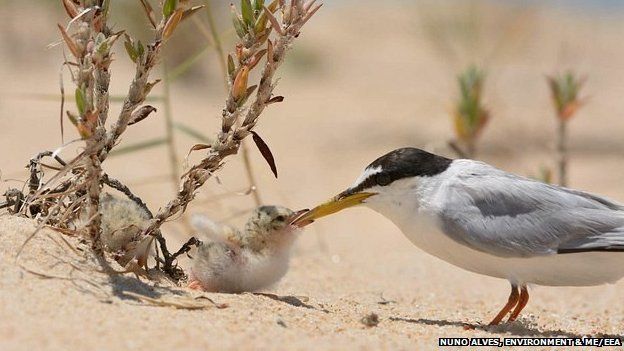UK among worst in wildlife league
- Published

The UK is among the worst countries in the EU for protecting its wildlife habitats, says an official report.
Britain, Belgium and Denmark report around 70% of habitats are in unfavourable or bad condition.
Holland registered just 4% of its habitats in good condition; environmentalists say the figures are unacceptable.
The report by the European Environment Agency and the European Commission is based on data from member states.
It says EU laws designed to protect wildlife and habitats appear to be working - but only in a patchy way.
The document, State of Nature 2015, comes after the European President Jean-Claude Juncker has launched a review into the fitness of the wildlife and birds directives.
Business groups have warned that "green tape" is hindering Europe's attempt to boost the economy and create jobs. Mr Juncker says he wants better regulations - but wildlife groups fear that means looser regulation.
Today's report shows only a minority of species in favourable conservation status in most member states.
Erosion of diversity
Habitats are in a worse condition than specific species. The report says agriculture is the biggest threat to biodiversity, with grasslands suffering worst of all as farming continues to intensify. The draining of wetlands is a continuing problem, too.
Over-fishing is damaging Europe's seas, and the marine environment has a particular concentration of threatened species. Changes to rivers are threatening fresh water habitats and species.
The report contains positive elements. It notes that the EU's Natura 2000 wildlife sites seem to be protecting all species which live in them.
Many of the most heavily-protected birds on Annex 1 of the Birds Directive are recovering, though not yet secure from the threat of extinction. Wintering birds - mostly waterbirds - are on the increase. But many of the species on Annex II (which may be hunted) are decreasing.
The areas with the best quality habitats are the Alps and the Black Sea. The Atlantic has the worst quality habitats. Italy has the highest percentage of habitats which are already unfavourable but getting worse (40%).
In most countries, between 3% and 20% of unfavourable species assessments are improving - but the UK, Denmark, Poland, Belgium and Holland are striving to catch up, with more than 20% improving.
Hans Bruyninckx, EEA executive director, said: The results are mixed but clear. When implemented well, conservation measures work and improve the status of habitats and species. Such improvements remain limited and patchy. Europe's diversity is still being eroded overall - and the pressures continue."
Follow Roger on Twitter.